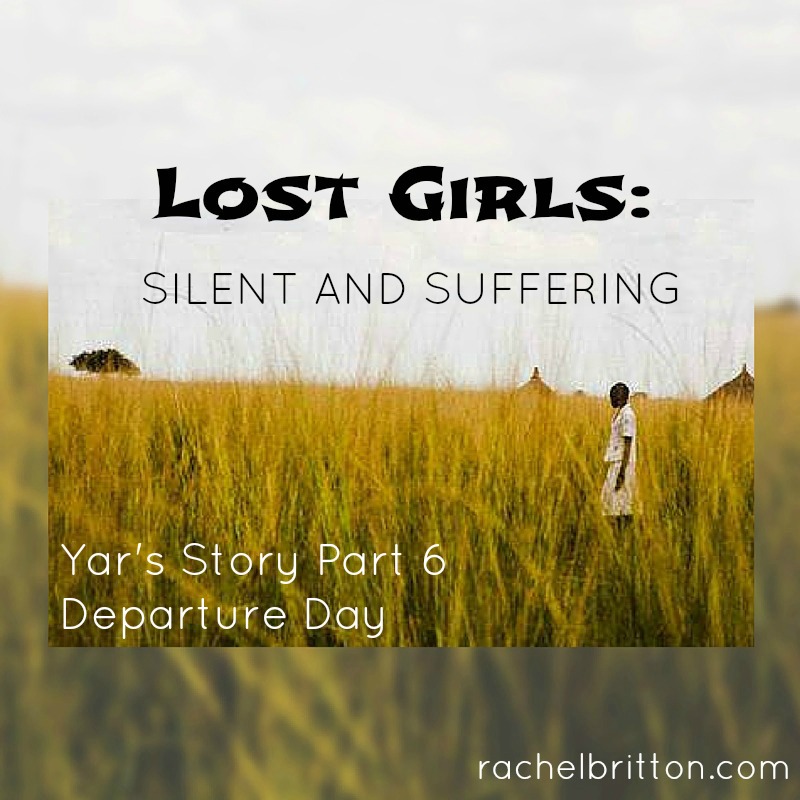It has been a tough two weeks since the last installment of Yar’s story. Violence and fighting has escalated in current-day South Sudan. The country is in a dire situation. People are starving and being slaughtered by their neighbors. Yar’s fear is that this tribal war will turn her country into another Rwanda. She also fears for her family—her sister, uncle and cousins—who are in South Sudan. They are unable to leave the country and unlike Yar’s situation in the story below, where for the FIRST time we see hope since the violence occurred back in her village, there is little hope for Yar’s family today, and the many other people in South Sudan.
Every day, I went to bed praying that my little brother and I would be spared.
Then one day I noticed a large group of boys clustered around a wall near the school building.
Rather than follow the rest of the girls back to my group # 33, Zone 3, I pushed my way through the throng and read the flyer attracting so much attention.
It invited Sudanese refugees in Kakuma to apply to move to America.
The United Nations refugee agency (UNHCR) determined that repatriation and family reunification was no longer an option for the Lost Boys. UNHCR recommended approximately 3,600 of them for resettlement in the United States and the US State Department concurred.
The Kakuma youth began arriving in the US in small groups in the fall of 2000. Over the next year the International Rescue Committee helped hundreds resettle in and around Atlanta, Boston, Dallas, Phoenix, Salt Lake City, San Diego, Seattle and Tucson. https://www.rescue.org/article/lost-boys-sudan
Without thinking, I picked up and filled out the form, and I joined the line with the many boys.
I was granted an interview, which turned out to include not just one but several sessions of being grilled by different anonymous, stern Americans.
I was terrified but not dissuaded by their impersonal, almost cruel treatment.
They never smiled; I never knew what type of teeth they had, whether they had crooked teeth or no teeth at all. I never saw their teeth, just their lips and an unforgiving look in their eyes.
In each interview, I told details of my life and listed my family members with exact precision. Leave out a detail or inadvertently drop one name and my chance to go to America would disappear.
Following the interviews, I participated in a two-day cultural orientation.
Leafing through my handbook with great care, I marveled at the opportunities and the freedom. There was food and free education—even for girls. It was a great country without violence.
At the end of the orientation, an American lady, the stern one from my first interview, approached me with a decision.
My brother and I would be placed in US custody as foster children. We would live with an American family who would take care of us, and we would call our foster parents ‘mother’ and ‘father’.
Only then did the enormity of my undertaking hit. At once, a wave of excitement and fear consumed me, and tears flooded my face.
December 22, 2000
After receiving the news that I had been approved to go to America, I readied for my departure.
I found myself doubting my decision even when my belly ached with hunger, even when I heard the terror-filled screams as my neighbors fought the demons of the night.
Nothing in my eight years prepared me, though, for December 22, 2000, departure day.
When the sun reached its highest point, I grabbed the small sack that contained my only possessions and took my brother’s hand.
Along with others, mainly boys, we made our way to the entrance of the camp.
Crowds of fellow Dinka joined us, crying and pulling us into them.
In Nairobi, we boarded the airplane to begin the next leg of our journey.
I looked out the window, sobbing.
How is one to prepare for saying goodbye to her homeland?
My brother, too, cried as we began, for the first time in our young lives, to take off into the clouds.
From Nairobi we flew to Amsterdam and then to New York. There, we transferred to a small commuter jet.
We were greeted by the shocking cold of winter.
Frosty wind bit at us as we crossed the tarmac and snow swirled into our eyes; a Nor’easter made mockery of our thin, summer clothing.
Underdressed and ill prepared, we boarded the last plane of our long journey and immediately were met by the disapproving glances of an elderly woman
She “tisk tisked” as we sat behind her.
My doubts, which took seed days earlier and were warmed by the hot, African sun, roared in my head.
Will you please continue to pray for Yar and her homeland. With the current hostilities – pray for peace and for the hatred and fighting to stop. Pray for the protection of women and girls. Pray for food to become available. Pray for Yar’s family.
I am telling Yar’s story in installments every other Tuesday. Please visit my Lost Girls page to read the previous installments.
Linking up with Crystal Storms at #IntentionalTuesday, Holley Gerth at #CoffeeforYourHeart and Kelly Balarie at #RaRaLinkup


Hi Yar,
I met you today in the RKidz room at Revive. At the time, I did not know that this was your story. After church, Lori Dupre asked me how many kids were with me today and I mentioned you were there and she told me how you had been connected to Revive through Rachel. I have just read your whole story and humbled and honored to have read it and to have met you. You are an amazingly inspiring person and a wonderful mom as was so evident today. I do hope to see you again as Lori was SO disappointed that she did not get to meet you.
It was a pleasure to meet you. I am disappointed too. I will try to visit again soon. Thank you so much for your warm welcoming. My children and I had an amazing time.
What a scary day, especially at 8 years old! Saying a prayer for Yar and her family!
Thanks, Sarah. Yar was a brave and bold little girl. She still is.
Hi Rachel continued thanks for sharing Yar’s story. It makes us all much more appreciative of our blessings and increases our awareness of the issues in the world around us. Praying for Yar and all those like her.
We have so much to be grateful for, don’t we? It’s humbling to think what others go through, especially children.